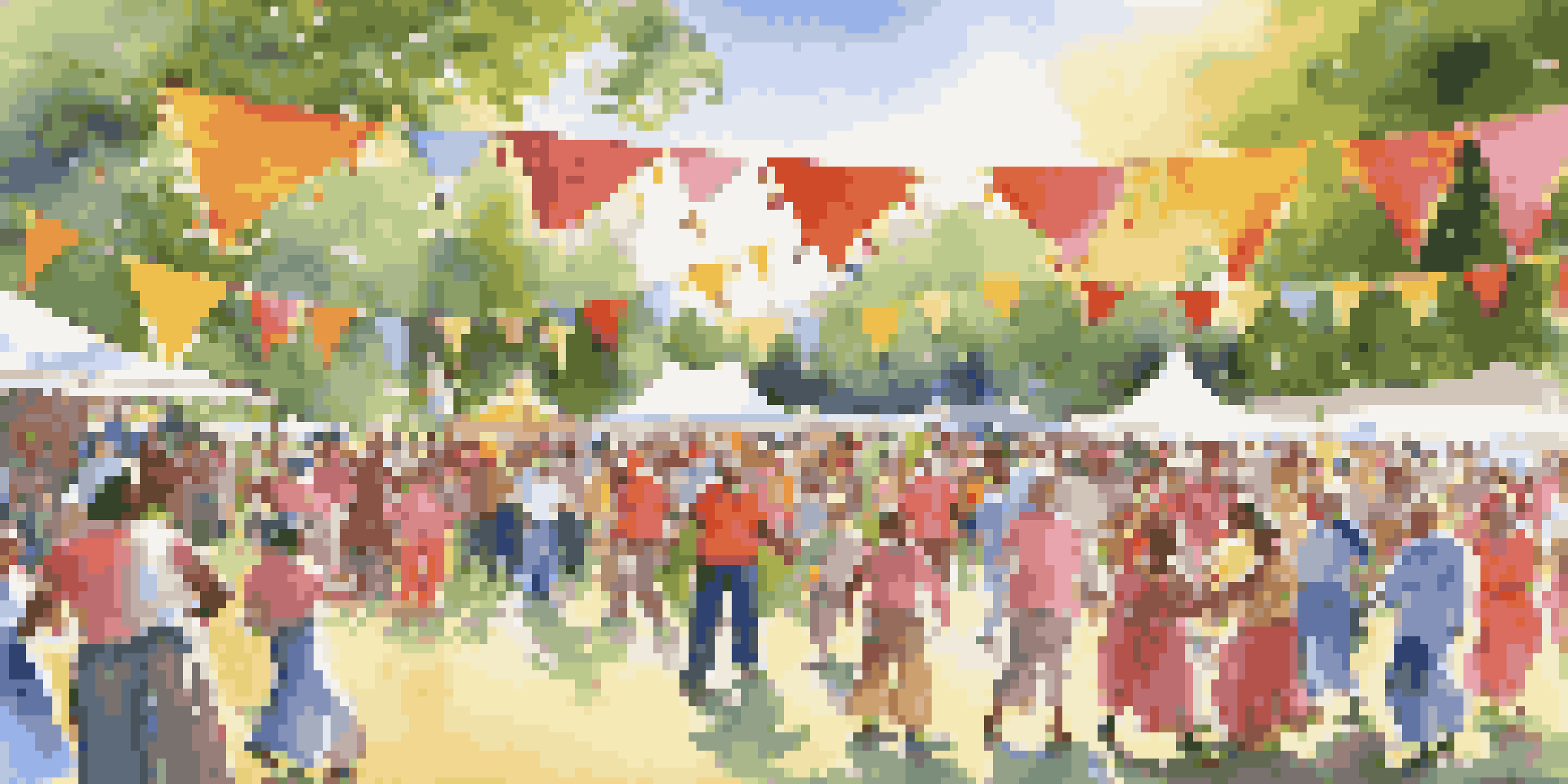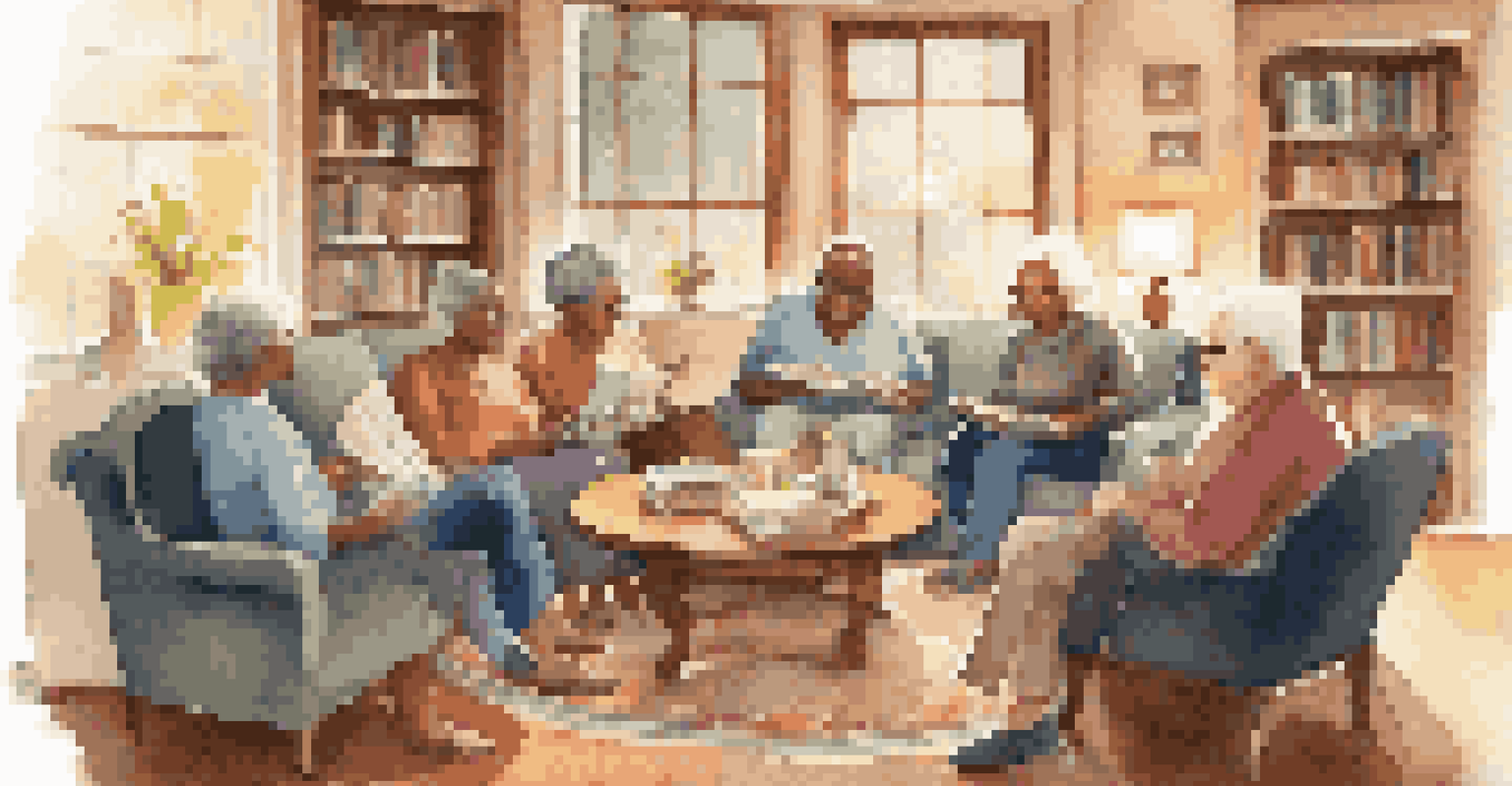Understanding the Role of Cultural Engagement in Aging

What is Cultural Engagement and Why It Matters
Cultural engagement refers to the ways individuals connect with their culture through art, music, literature, and community activities. For older adults, this engagement can play a crucial role in their overall well-being and happiness. It provides a sense of belonging and purpose, which can be vital as one navigates the later stages of life.
Culture is the widening of the mind and of the spirit.
Being culturally engaged means actively participating in activities that resonate with one's heritage or interests. This could involve attending local cultural festivals, joining a book club, or participating in art classes. These activities not only stimulate the mind but also foster social connections that can combat loneliness, a common issue in aging populations.
Moreover, cultural engagement promotes lifelong learning, encouraging seniors to explore new hobbies or revisit old passions. This kind of mental stimulation can enhance cognitive function, making cultural activities not just enjoyable, but also beneficial for mental health.
The Psychological Benefits of Cultural Activities
Engaging in cultural activities can significantly improve mental health. For instance, attending a concert or participating in a community theater can elevate mood and reduce feelings of depression. These experiences often provide joy and excitement, making life feel more vibrant.

Furthermore, cultural activities can serve as a form of self-expression, allowing older adults to share their stories and experiences. This sharing can help validate their life experiences, contributing to a stronger sense of identity and self-worth. As they reflect on their past, they can find meaning and connection with their peers.
Cultural Engagement Enhances Well-Being
Participating in cultural activities fosters social connections and combats loneliness, significantly improving the well-being of older adults.
Research has shown that individuals who actively participate in cultural events tend to report lower stress levels and increased life satisfaction. By fostering a sense of community and belonging, cultural engagement becomes a powerful tool in enhancing mental resilience during the aging process.
Building Social Connections through Culture
Cultural engagement serves as a bridge for building social relationships among older adults. Participating in group activities, such as dance classes or art workshops, creates opportunities for individuals to meet others with similar interests. These interactions can lead to friendships that may not have otherwise developed.
The arts are not a way to make a living. They are a very human way of making life more bearable.
As many seniors face social isolation, engaging in cultural activities can combat this loneliness. Regularly attending events or classes provides a structured routine and a reason to get out, which can be essential for mental health. The shared experiences during these activities often foster camaraderie and support networks.
Additionally, cultural engagement can encourage intergenerational connections, as families and younger community members often participate in cultural events. This interaction can enrich both older and younger generations, allowing them to learn from each other while celebrating their shared heritage.
Cultural Engagement and Cognitive Health
Participating in cultural activities is not just about enjoyment; it can also enhance cognitive health. Engaging in creative pursuits, such as painting or writing, stimulates the brain and can help maintain cognitive functions. This kind of mental exercise is crucial in staving off cognitive decline associated with aging.
Moreover, cultural activities often require critical thinking and problem-solving skills. Whether it's deciphering the meaning of a piece of art or learning a new dance, these challenges keep the brain active and engaged. The more mentally stimulating experiences one has, the better the chances of preserving cognitive abilities.
Cultural Activities Boost Cognitive Health
Engaging in creative pursuits stimulates the brain, helping to maintain cognitive functions and reduce the risk of decline in seniors.
Studies have shown that older adults who engage regularly in cultural activities have a lower risk of developing cognitive impairments. By incorporating these activities into their routines, seniors can enjoy not only the social and emotional benefits but also the cognitive advantages.
Cultural Heritage as a Source of Strength
Cultural heritage can be a powerful source of strength for older adults. It connects them to their roots and family histories, providing a sense of identity that can be comforting in later years. Engaging with one’s heritage through storytelling, traditional music, or dance can reignite pride and connection to one's past.
For many, this connection can lead to improved mental health and a sense of purpose. When seniors share their stories or cultural practices with younger generations, it nurtures a sense of legacy and belonging. This transmission of culture can be incredibly fulfilling, reinforcing their role within the community.
Moreover, celebrating cultural heritage can foster resilience during challenging times. Engaging with familiar traditions and customs can provide comfort and stability, helping older adults navigate the complexities of aging with a stronger sense of self.
Challenges in Cultural Engagement for Seniors
While cultural engagement offers numerous benefits, there can be challenges that older adults face. Mobility issues, lack of transportation, or health problems can hinder participation in cultural events. These barriers can lead to feelings of frustration and isolation, counteracting the positive effects of cultural engagement.
Additionally, some seniors may feel out of touch with contemporary cultural trends, making them hesitant to participate in certain activities. This reluctance can stem from a fear of not fitting in or being unable to keep up with younger participants. Addressing these feelings is essential for encouraging greater involvement.
Overcoming Barriers to Participation
Addressing challenges like mobility and isolation is essential for promoting greater cultural engagement among older adults.
To overcome these challenges, community organizations can play a vital role by offering accessible programs and creating inclusive environments. By understanding the barriers seniors face, we can better tailor cultural opportunities to ensure everyone can participate and benefit.
Encouraging Cultural Engagement in Aging Populations
Encouraging cultural engagement among older adults requires a proactive approach from families and communities. Simple actions, like inviting seniors to local events or introducing them to new hobbies, can make a significant difference. These small gestures can open doors to new experiences and friendships.
Additionally, community centers and organizations can play a crucial role by hosting events specifically designed for seniors. Offering workshops, classes, or cultural festivals that cater to their interests can foster a welcoming environment that invites participation and exploration.

Finally, creating awareness about the benefits of cultural engagement can motivate older adults to seek out these opportunities. Sharing success stories and testimonials can inspire individuals to step out of their comfort zones and embrace the enriching experiences that cultural activities can provide.